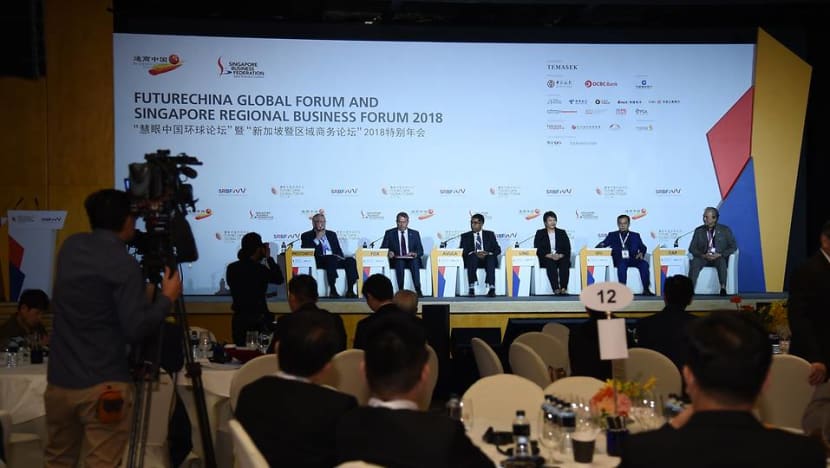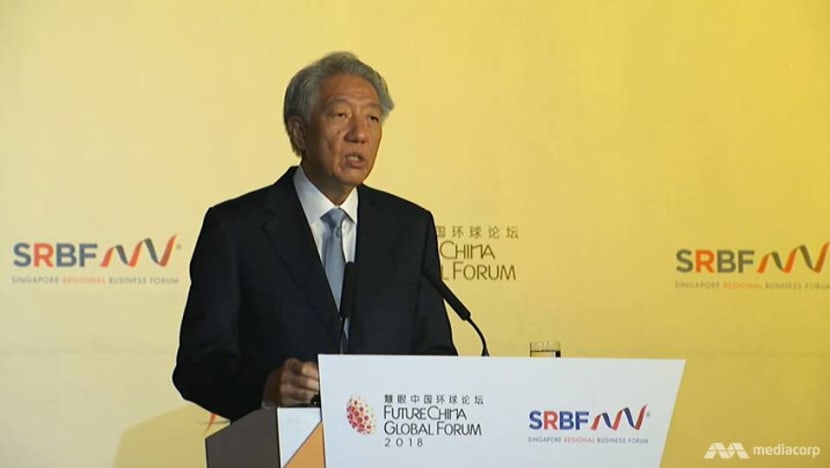Trade war fears weigh heavily at FutureChina forum
As the trade war between the world’s two largest economies continue to play out, with negotiations yielding little compromise so far, the global economy is showing signs of slowing down.

Opening plenary session of the FutureChina Global Forum. (Photo: Business China)
SINGAPORE: As the trade war between the world’s two largest economies continues to play out, with negotiations yielding little compromise so far, the global economy is showing signs of slowing down.
The fact that protectionism is becoming more apparent globally, at a time when the world economy looks vulnerable, was a point highlighted on the first day of the two-day FutureChina Global Forum and Singapore Regional Business Forum in Singapore on Monday (Aug 27).
Speakers including Singapore Deputy Prime Minister Teo Chee Hean and UK Trade Secretary Liam Fox extolled the merits of the multilateral trading system, and urged countries to keep trade open and free.
"The multilateral trading system has catalysed economic development, uplifted countries and regions, and narrowed economic disparities. This has also reduced the potential for conflict and promoted peace,” said Mr Teo.
“We need to continue to strengthen this multilateral system and ensure that trade remains free and fair.”

Mr Fox said prosperity from free trade underpins the social cohesion that is crucial for political stability.
While he voiced some familiar charges of unfair play by China, he cautioned that it would be unwise to upend the current rules-based multilateral trading system - clearly making a reference to US President Donald Trump’s threat to leave the World Trade Organisation.
"We’ve developed an interdependence in a way that hasn’t existed in history. We need better global behaviour ... I can understand why Western countries are impatient about Chinese behaviour,” said Mr Fox. “The alternative to rules-based system is a deal-based system between the world’s most powerful, and that would leave many countries behind.”
Meanwhile, other panellists warned against viewing trade as a zero-sum game, and analysed how ASEAN - caught in between two giants - should react.
“I don’t think the development of China or some (other) big country will form any crowding out effect to other countries,” said Qiu Zhikun, General Manager and Country Head, Bank of China Singapore branch.
Selena Ling, OCBC Bank's chief economist, felt it would be difficult for ASEAN to pick sides, and that if it were to do so, it would be in a “precarious position”. “The strategy should be to cooperate and compete,” she added.
In all, about 800 participants attended Day 1 of the Forum. While it was clear that what was weighing on the minds of business leaders are global uncertainties brought on by the trade tensions, participants and speakers also touched on other topics, including tech and innovation, China’s Belt and Road projects, and ASEAN-China connectivity.
Into its ninth year, much of the driving force behind the FutureChina Global Forum was former Singapore prime minister Lee Kuan Yew, who sought to understand and build good relations with China. The Forum lives on in that spirit, in providing the platform for China watchers to gather and exchange views.













